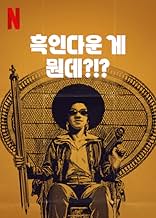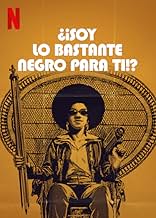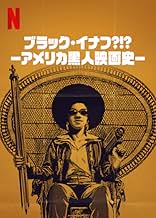O historiador e crítico cultural Elvis Mitchell traça a evolução e a revolução do cinema negro, de suas origens ao impacto dos filmes da década de 70.O historiador e crítico cultural Elvis Mitchell traça a evolução e a revolução do cinema negro, de suas origens ao impacto dos filmes da década de 70.O historiador e crítico cultural Elvis Mitchell traça a evolução e a revolução do cinema negro, de suas origens ao impacto dos filmes da década de 70.
- Prêmios
- 4 indicações no total
- Narrator
- (narração)
- Self
- (as Louise Archambault Greaves)
- Self
- (as Jim Signorelli)
Avaliações em destaque
Couple of comments: this is the directing debut of longtime writer, producer and film critic (including at one point for the New York Times) Eric Mitchell. Here he fondly looks back to the golden years of black film making, which he identifies as 1968 to 1978. And "film making" is to be understood in a broad sense: not just actors, but also producers and directors and anyone else involved directly and indirectly. Everyone knows of the phenom that was "Shaft" but as Mitchell demonstrates, there were so many other noteworthy black films in that era, many of which were made outside of the Hollywood studio system and hence never seen by most of us, including many of the so-called blaxploitation movies ("blaxploitation is the commoditization of blackness", observes one of the talking heads). The works of Gordon Banks and Melvin Van Peebles get extensive attention, and along the way we get dozens and dozens of movie clips, one better/more intriguing than the other. It leads one (or at least me) to want to see these movies. It was amazing for me how quickly these 2 hrs. And 15 min came and went, and a genuine pleasure to watch this from start to finish. Last but not least, in the movie's opening credits, the title is showing as "Is That Black Enough For You?!? How One Decade Forever Changed the Movies (And Me)".
"Is That Black Enough For You?!?" premiered in early October at the new York Film Festival to immediate critical acclaim, and it is currently rated 100% Certified Fresh on Rotten Tomatoes, and for good reason. If you have any interest in a slice of movie history which most of us know very little about, I'd readily suggest you check this out, and draw your own conclusion.
Lady Sings The Blues- I was young when my mom took me to see this in the theater. I was 8, but I was told this was an important movie of an historical figure that needed to be implanted into my young mind. I honestly don't recall the makeup of the audience but I do remember the seats being packed, and being angry at the end. My mother explained to me how important Billie was to music today, and how awful humanity can be to one another.
That's a pretty heavy message to lay on an 8-year olds head, but the message was not lost on me. My point is, not every white person was avoiding important black films and during the 70s, racism was being addressed and a lot of white people were horrified. Growing up in and around Madison, WI, there were quite a few black children in my class, and it honestly never occurred to me that they were anything other than classmates, and some were my friends.
As I grew, things like Roots, Blazing Saddles, Mahogany, Car Wash and stealing listens to my dad's Pryor and Red Foxx albums dot my youth and it wasn't ever presented as anything other than entertainment- my parents weren't 'white knighting' for black culture,!there was just pop culture and skin color had nothing to do with it.
Now, make no mistake, I'm certainly not saying there was no racism, no ignorance, stupidity, but not everyone was a racist hilljack from Alabama- it just didn't occur to us to judge anyone by anything other than their character and fortitude.
I find it a little odd that there's not a single reference to Roots- how does one discuss black film and dismiss out of hand this important contribution? I remember being a teen and seeing Richard Pryor and Gene Wilder in a few buddy movies, along with Gregory Hines and Billy Crystal- there was significant overlap in racial viewing, and bands mentioned like EWF, along with other funk bands like Commodores, Sly and the Family Stone, Rick James, etc that had soaring success with as many white fans as black.
It's ironic that Poitier declined to be interviewed for this, and speaks volumes when the producers list includes conspicuously white names like Steven Soderbergh and David Fincher. I'm not sure what purpose is served by this doc, and what the intended consequences are- there's no amount of revisiting the issues that will change the outcomes, and the outcomes intended here aren't necessarily that of truthfulness, either. Billy Dee Williams had a significant impact on the genre of film, as did Sidney Poitier, Denzel Washington, Morgan Freeman, the list goes on and on.
Unfortunately, there are two major problems with this documentary. First is it skips over a lot. If not completely skipping it only skims the surface of those films, performers and filmmakers. Some of which it can be argued are more important that a lot that was included. Often they opted to cover & present as more influential fairly obscure films (never even released on DVD) rather than more successful films. Still what it did cover was entertaining.
Second, it made it sound like much of black cinema especially the 1960's to 1980's was only for black film goers. Some of these movies were successful because they also reached a white or other audience. Movies like Shaft, Coffey & others they mentioned were simply excellent movies with excellent performances, period. Funny they kind of mention that Motown music was only for black audience. Ridiculous. Even the Beatles recorded a couple of Motown songs.
I will rate this 7 out of 10, mainly for being entertaining. Plus I did learn about some films I've never heard of.
Basically, the issue here is that the film maker has decided that he wants to cover a LOT of Black films, which forces him to deal with some of them very quickly. One of the seven previous viewers attributes this to a desire on Mitchell's part to show off how many Black films he has seen, but that was not my impression. Rather, it's clear that he is fascinated with a lot of these movies, and intent on sharing his fascination and knowledge with us. That's hard to do in a movie, though, unlike in a book. Mitchell might have thought about doing what Ken Burns has done with some of his documentaries: focus on the most telling things in the movies themselves, and then provide the rest of the information in an accompanying picture book.
Books are good for annotated lists. Movies, not so much.
On the hand, because Mitchell sometimes seems like he is trying to be encyclopedic, some of the seven previous reviewers have criticized him for leaving out X or Y Black film or star. A few have a point, but others didn't pay attention. One complained that Mitchell left out James Brown, for example, which is not true. There is a very striking scene of Brown standing shirtless in a doorway, in all the glory of his virile, muscular, and very angry masculinity. It would have been nice to learn if he was offered roles other than those, but that would have taken more time than Mitchell had in this movie.
The same is true of some of the other previous criticism. Those viewers just didn't watch closely enough.
My take on this is that it was interesting for what it offered, but that it often left me wishing for more than just a tidbit on a given interesting movie. So, I guess, I would have preferred less encyclopedic coverage and more in-depth analysis of fewer movies.
On the other hand, I don't regret having seen any of what I saw.
Mitchell clearly knows this material. He should definitely treat us to an accompanying illustrated book, where he is not limited by time.
Você sabia?
- Erros de gravaçãoWhile discussing Um Sonho de Liberdade (1994), the narrator identifies Rita Hayworth as white. Hayworth's real name was Margarita Carmen Cansino, and she was of Romani descent (an Indo-Aryan ethnic group, also known by the term "Gypsies"). She had her name changed, and appearance slightly altered, to aid her career. Prior to that, as Rita Cansino, she had been limited to smaller exotic roles.
On a related note, towards the end of The Shawshank Redemption, Andy has replaced the poster of Rita Hayworth with a poster of Raquel Welch. Welch was born Jo Raquel Tejada, but went by "Raquel Welch" for the sake of her career (to avoid getting trapped into roles available to Latinas). She did not acknowledge her true heritage until she worked on American Family (2002).
- Citações
Harry Belafonte: Not one picture that I turned down did I regret not doing. I didn't resent any of them. I'm glad others got an opportunity and went off and did it, but my initial... First and foremost, I'm an artist. I'm an actor. And I came out of a school with Marlon Brando, Walter Matthau, Rod Steiger, Tony Curtis, with a director that gave us no quarter. I'm not gonna do anything other than what I think is worthy of being done. And fortunately for me, I was a runaway success in the world at large because I had a globe so passionately approving of my presence in their midst that nobody could dismiss the fact that that thing on the horizon called Belafonte could really not be fucked with. Because anytime anybody came up and gave me an ultimatum, I said, "Fuck you. I'm going to Paris. I'll probably live there if I like, but I... I have a destination that answers your denial of what I could be."
- ConexõesFeatures A Fool and His Money (1912)
Principais escolhas
- How long is Is That Black Enough for You?!??Fornecido pela Alexa
Detalhes
- Data de lançamento
- País de origem
- Central de atendimento oficial
- Idioma
- Também conhecido como
- Is That Black Enough for You?!?
- Empresas de produção
- Consulte mais créditos da empresa na IMDbPro
- Tempo de duração
- 2 h 15 min(135 min)
- Cor
- Mixagem de som





































